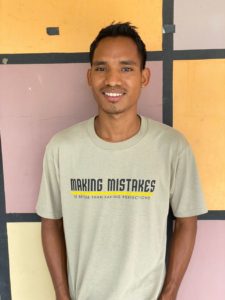There is so many amazing people working at Maluk Timor – each with their own stories to tell. Antonito Cabral is no exception – a journey that took him into applied statistics and now the Monitoring and Evaluation (M&E) Officer for the ASTEROID programme.
Every day we are flooded with information in everything we do. We need this information to give us insight. To get an understanding about why things happen – statistics is the heart of this.
When I was young, as with so many people, I wanted to be a doctor when I grew up. I tried to get into medical school, but I failed. Somehow, I fell into statistics. At school, I loved mathematics and we learnt about Timor-Leste’s Census; I found it fascinating. So much amazing information and so much we can learn from it. I didn’t realise at the time, but it would become my vocation.
When I talk to my friends who are doctors, I say “to be a doctor is my crush, but I am dating statistics…”
I applied for a scholarship, which happened to be in statistics, and I was successful. The course was in Jakarta, Indonesia. It was a good course, but very theoretical, so after a while, I decided I needed something that was more practical. I quit the scholarship, moved to Surabaya, and started studying Applied Statistics.
COVID came – and like so many people, I had to return home to Timor-Leste. I wasn’t quite finished, but I was able to finish on-line. One day I saw the job vacancy for the M&E officer with the ASTEROID Program – the criteria was relevant for my background. I had never been an M&E officer, but the internship I did when I was at University, gave me a good understanding. So here I am at Maluk Timor.
M&E is a very important tool for strengthening the health system in many ways. Using the example medical equipment and consumables for the Community Health Centres (CHC); through RFA (Rapid Facility Assessment), we evaluate the needs of the CHC.
We can give the CHC something they need, rather than something someone else thinks is a good idea.
Electricity is a problem in our country and particularly in some of the remote posts. A power cut at night, a baby is being delivered, the midwife is working by kerosene lanterns or candle light. Thorough our RFA, we found that a rechargeable lantern would make the world of difference.
The ASTEROID program was able to donate one and now when there is a power cut, babies are delivered by a rechargeable lamp light! So much better, safer and easier for everyone.
In ASTEROID, we train about Infection Prevention and Control (IPC), diagnostics and reporting to the National Surveillance System. The Statistics we collect are also used by the Ministry of Health to help strengthen the health system. We do pre and post-tests, and then I analyse the data. We need to see that they understand what they have learnt.
If the results are not good, we need to understand so we can make it training better. We look at the analysis and see if it is the facilitator who needs to improve, or if it is something else. We need to understand what is needed to be able to do our jobs better.
Some things are so simple to create change.
One time while I was at university – I had to do a survey of students about how students choose their majors at high school and how much influence their families have in making the decision. One of my friends joked with me that this survey might be helpful in getting a girlfriend – through the data collected from the questionnaire.
This motivated me to be a good researcher he said laughing. Maybe statistics could be useful a little closer to home. I spent Valentine’s Day writing an algorithm for finding the right woman for me – maybe I should have been talking to people instead.
But seriously, applied statistics can be used for so many things. We can use it to help reduce infant mortality – we can map the information using indicators like which city/area/ or even socio-economic issues – all this information gives us a much better understanding and can be a vital tool when strengthening health systems.
So now I work with doctors, instead of being one.
But I believe the work that I can do is very important it helping Timor-Leste create a stronger health care system.

